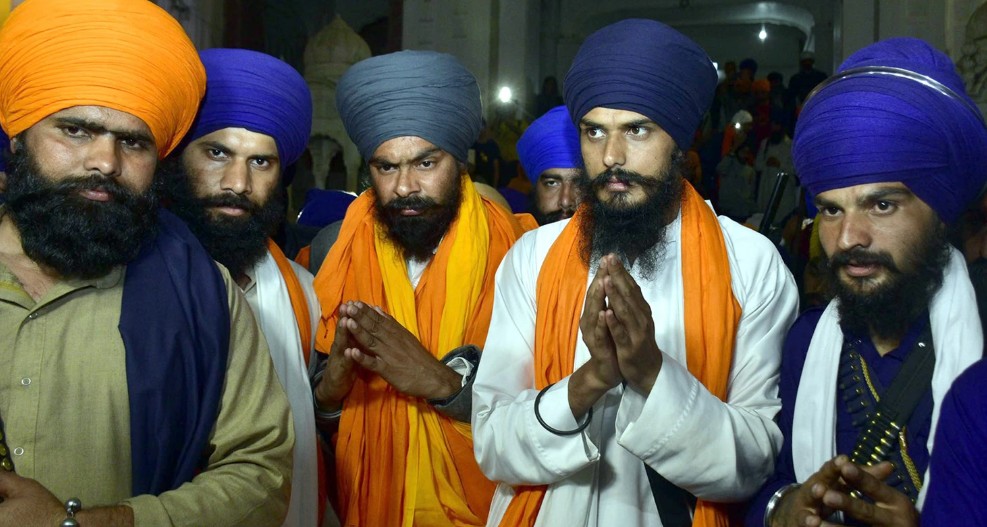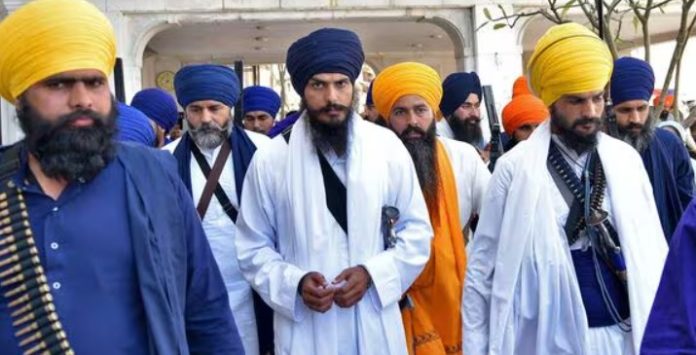In a significant development that has stirred political and social discourse, the Punjab government has decided not to reinvoke the National Security Act (NSA) against seven aides of Amritpal Singh, the radical Sikh preacher and leader of the ‘Waris Punjab De’ movement. This decision comes after months of intense debate and legal battles that have drawn attention from both national and international communities.
The seven individuals in question were initially detained under the stringent NSA following their alleged involvement in activities that posed a threat to public order and national security. The NSA, which allows preventive detention for up to a year without formal charges, was invoked in response to concerns over potential violence and unrest linked to Amritpal Singh’s separatist ideology. However, after a thorough review of the cases, the Punjab government concluded that there was insufficient evidence to justify continued detention under this draconian law.
The decision to withdraw the NSA charges stems from multiple factors, including mounting pressure from human rights organizations and legal experts who argued that the law was being misused to suppress dissent. Critics pointed out that the application of the NSA in this context was excessive and violated the constitutional rights of the detainees. Moreover, the lack of concrete evidence linking the aides to acts of terrorism or violence further weakened the state’s case.
Family members of the accused had also been vocal in their demand for justice, claiming that the detentions were politically motivated and part of a larger crackdown on the pro-Khalistan movement. Their pleas gained traction among Sikh advocacy groups and civil rights activists, who organized protests and filed petitions challenging the legality of the NSA detentions.
In response to these concerns, the Punjab government established a review committee to assess the validity of the NSA charges. After a comprehensive evaluation, the committee recommended that the cases did not meet the threshold for invoking the NSA. Consequently, the government decided to release the detainees, although they will still face investigation under other applicable laws.

This move has been hailed as a victory for human rights and due process by legal experts and activists. It is seen as a step toward restoring public trust in the judicial system and upholding the rule of law. However, some political analysts argue that the decision reflects the government’s attempt to de-escalate tensions and avoid further alienating the Sikh community, which has been historically sensitive to issues of religious freedom and political representation.
The decision also raises questions about the broader implications for Punjab’s security landscape. Amritpal Singh and his supporters have been vocal advocates for the establishment of a separate Sikh state, known as Khalistan. Their rhetoric and actions have sparked concerns among security agencies about potential radicalization and violence. By choosing not to reinvoke the NSA, the Punjab government is walking a fine line between maintaining law and order and respecting civil liberties.
Furthermore, this development highlights the ongoing debate over the use of preventive detention laws in India. The NSA, originally intended to combat terrorism and protect national security, has often been criticized for being used as a tool to silence political dissent and target marginalized communities. Human rights organizations have long called for reforms to prevent the misuse of such laws and ensure greater transparency and accountability in the legal process.
In the case of Amritpal Singh’s aides, the decision to withdraw the NSA charges is seen as a step in the right direction. However, the Punjab police have clarified that the individuals will remain under surveillance and could face legal action if evidence of criminal activity emerges in the future. This approach aims to balance security concerns with the need to uphold democratic principles and protect individual rights.
The decision has also drawn reactions from political leaders and community representatives. Some have praised the government for demonstrating restraint and respecting the rule of law, while others have criticized the move as a sign of weakness in dealing with separatist elements. The Shiromani Akali Dal, a prominent Sikh political party, welcomed the decision, stating that it reflects the government’s commitment to justice and fair treatment of the Sikh community. On the other hand, opposition parties accused the government of capitulating to pressure from pro-Khalistan groups.
The international community is also closely watching the situation in Punjab. Sikh diaspora organizations in countries like Canada, the UK, and the US have expressed support for the decision and called for further dialogue to address the underlying grievances of the Sikh population. At the same time, Indian security agencies remain vigilant, warning that any resurgence of separatist activity will be met with a firm response.
As Punjab navigates this complex and sensitive issue, the decision not to reinvoke the NSA against Amritpal Singh’s aides sets a precedent for handling similar cases in the future. It underscores the importance of due process, accountability, and respect for human rights in maintaining social harmony and political stability. However, the state government must remain vigilant and proactive in addressing the root causes of dissent and preventing any escalation of violence.
In conclusion, the Punjab government’s decision to withdraw NSA charges against the seven aides of Amritpal Singh is a multifaceted and politically nuanced move. While it has been welcomed by human rights advocates and community leaders, it also poses challenges for law enforcement and security agencies tasked with maintaining peace and stability in the region. As the situation continues to evolve, the government’s handling of this issue will play a crucial role in shaping Punjab’s political landscape and fostering communal harmony.


